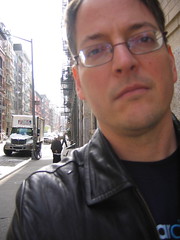Drawn With A Very Fine Camelhair Brush
I was pleased to find that there were (as of 1993) exactly twenty five kinds of nouns, no more, no less. Here they are, after the fashion of "Celestial Empire of benevolent Knowledge"[1]
The list is from "Five Papers on WordNet"[2]. WordNet is a dictionary on steroids. Or maybe LSD. Instead of being the typical alphabetical list of definitions, it's a queriable database of word relationships organized according to psycholinguitic theories.
The paper reminded me why I bothered to get a Linguistics degree. It's no doubt out of date with regard to the number twenty-five, but that's not really the point.
The list is reminiscent of the kinds of things you get with a priori philosophical languages. The search for the perfect philisophical language (one that reflects the nature of reality directly, and can be logically manipulated to find "truth"), has taken up a lot of time and effort over the past dozen or so centuries. I suspect that the semantic web is the latest link in this chain of well-meant silliness. Umberto Eco, in his book The Search for the Perfect Language, goes into great detail on the subtle addictiveness of that sort of thing, and how the scientifically inclined mind is apt to get trapped in an obsessive investigation into Hermetic mysteries while claiming to be engaging in science. But what the heck, it got us the Dewey Decimal system. Perhaps RDF, shorn of the "Semantic Web", will amount to something similiarly flawed-but-useful.
WordNet isn't a philisophical language, though on the surface it could be mistaken for one. WordNet isn't designed to reflect the perfection of the universe, but to reflect the imperfect view of the world as seen through human eyes and interpreted through words. It uses commonsensical and scientifically well founded theories of language. It records instead of imposes, and has no pretension of perfection. I really like WordNet.
For the curious, the Celestial Empire list restricts itself to animals, which are divided as follows: (a) belonging to the emperor, (b) embalmed, (c) tame, (d) sucking pigs, (e) sirens, (f) fabulous, (g) stray dogs, (h) included in the present classification, (i) frenzied, (j) innumerable, (k) drawn with a very fine camelhair brush, (l) et cetera, (m) having just broken the water pitcher, (n) that from a long way off look like flies.
[1] The Analytical Language of John Wilkins
Jorge Luis Borges
http://www.alamut.com/subj/artiface/language/johnWilkins.html
[2] Five papers on WordNet
Miller, George A., Christiane Fellbaum, Katherine J. Miller.
ftp://ftp.cogsci.princeton.edu/pub/wordnet/5papers.ps
tags:wordnet,blog,july,2005,lexical,psycholinguistics,noun,ai,rdf,eco,borges,wilkins,linguistics
| {act, action, activity} | {natural object} |
| {animal, fauna} | {natural phenomenon} |
| {artifact} | {person, human being} |
| {attribute, property} | {plant, flora} |
| {body, corpus} | {possession} |
| {cognition, knowledge} | {process} |
| {communication} | {quantity, amount} |
| {event, happening} | {relation} |
| {feeling, emotion} | {shape} |
| {food} | {state, condition} |
| {group, collection} | {substance} |
| {location, place} | {time} |
| {motive} |
The list is from "Five Papers on WordNet"[2]. WordNet is a dictionary on steroids. Or maybe LSD. Instead of being the typical alphabetical list of definitions, it's a queriable database of word relationships organized according to psycholinguitic theories.
The paper reminded me why I bothered to get a Linguistics degree. It's no doubt out of date with regard to the number twenty-five, but that's not really the point.
The list is reminiscent of the kinds of things you get with a priori philosophical languages. The search for the perfect philisophical language (one that reflects the nature of reality directly, and can be logically manipulated to find "truth"), has taken up a lot of time and effort over the past dozen or so centuries. I suspect that the semantic web is the latest link in this chain of well-meant silliness. Umberto Eco, in his book The Search for the Perfect Language, goes into great detail on the subtle addictiveness of that sort of thing, and how the scientifically inclined mind is apt to get trapped in an obsessive investigation into Hermetic mysteries while claiming to be engaging in science. But what the heck, it got us the Dewey Decimal system. Perhaps RDF, shorn of the "Semantic Web", will amount to something similiarly flawed-but-useful.
WordNet isn't a philisophical language, though on the surface it could be mistaken for one. WordNet isn't designed to reflect the perfection of the universe, but to reflect the imperfect view of the world as seen through human eyes and interpreted through words. It uses commonsensical and scientifically well founded theories of language. It records instead of imposes, and has no pretension of perfection. I really like WordNet.
For the curious, the Celestial Empire list restricts itself to animals, which are divided as follows: (a) belonging to the emperor, (b) embalmed, (c) tame, (d) sucking pigs, (e) sirens, (f) fabulous, (g) stray dogs, (h) included in the present classification, (i) frenzied, (j) innumerable, (k) drawn with a very fine camelhair brush, (l) et cetera, (m) having just broken the water pitcher, (n) that from a long way off look like flies.
[1] The Analytical Language of John Wilkins
Jorge Luis Borges
http://www.alamut.com/subj/artiface/language/johnWilkins.html
[2] Five papers on WordNet
Miller, George A., Christiane Fellbaum, Katherine J. Miller.
ftp://ftp.cogsci.princeton.edu/pub/wordnet/5papers.ps
tags:wordnet,blog,july,2005,lexical,psycholinguistics,noun,ai,rdf,eco,borges,wilkins,linguistics
You should follow me on twitter here.


0 Comments:
Post a Comment
<< Home